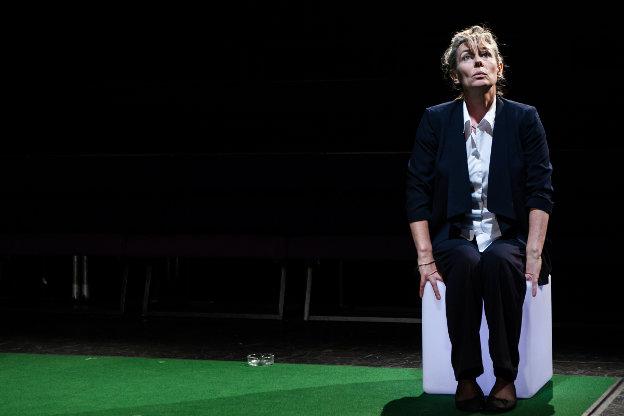In which Chris Goode comes of age, taking words out of the mouth of babes and onto the stage of the Trav…
Monkey Bars is a piece of verbatim theatre, with texts taken from interviews with children between the ages of six and eleven (conducted by Goode’s collaborator Karl James – mediator, facilitator, and director, known for his work with Tim Crouch) placed into the mouths of adult actors – actors who play adults, not adults playing children. Still with me? Good. Goode. Those who have followed his work will know that Chris Goode likes words, and likes using words spoken or written by others to craft extraordinary and eloquent theatre pieces – see, for example, Hippo World Guest Book, which used texts from a website for hippo enthusiasts. Yep, hippos. ‘Never work with children or animals,’ said WC Fields. Well, we can ignore him and live dangerously…
So, we have wine-supping ladies talking about the joys of Haribo fried egg sweets; and grown men in ties grumbling that all the girls want to do is play, ‘Girls catching boys. It’s wrong.’
There are cakes and superheroes and bubblegum and broken arms. There’s a boy who sings to his jelly, and a girl who likes to play rugby. We have reflections on fame (‘You have to put on your make-up just to go down the corner shop, which I think is quite sad really’), on the oppression of the media (‘They’re telling you the crime rate has gone up… we don’t need to know that cos now we are going to be even more scared’), and on the monarchy (‘Our money’s going to them, like buying their jewels.’) There are eloquent accounts of frightening experiences: ‘A man he got hit by a car… and it looked like a ragdoll, and it was just lying on the floor. And I got so freaked out, I was so scared.’ There are hilarious exchanges on money and wealth: ‘Fake money – they can print it off the internet!’ There are worrying exposes of domestic violence and family discord: ‘When my dad was beating up my mum, I gave my mum the umbrella…’
It’s crafted beautifully, the whole thing choreographed with tender loving care. The scenography is simple but effective: a set of ten white glowing cubes are moved around the space by the actors, sat on, stacked, turned into sofas and desks and chairs as needed. A red light upstage references the recording ‘on’ of the interviews. The actors group and regroup in the space, the scenes played out as monologues, dialogues, group discussions. These adults behaving as adults but talking like children reveal, through the children’s words, that we are all – of whatever age or social class – essentially the same, concerned about the same things. We want to be loved. We want to be happy. We want to be approved of. We want to be successful; on whatever terms we define success. We dream of falling. We are frightened of being mugged. We don’t know quite how to handle the opposite sex. We are distrustful of authority. We sometimes feel ashamed or overwhelmed. We worry about change – be it a new job or moving on to Secondary School (and although the age range of children interviewed was six to eleven, I think I detect more voices from the older end of this age span.)
If there’s a criticism, it is less of the work – which is a very complete and inspiring piece of theatre – than of some of the hyperbole around it. Monkey Bars works as a piece of theatre because transposing words said by one person to a different person, one who we wouldn’t expect to be saying those words, often opens our ears to really hear what is being said. As, for example, in Forced Entertainment’s ground-breaking show Speak Bitterness in which women’s stories of abuse are spoken by male actors. So this is in fact a tried and tested theatrical device. And although appreciative of the way in whichMonkey Bars reappraises children’s words, I’d dispute the claim that we don’t listen to our children. In my experience, parents (myself included) are often full of awe and wonder at how intelligent and insightful our children are, but aware that people who are child-free are often suspicious of and impatient around children. That Chris Goode is a man who, despite not being a parent, is someone who really wants to listen to children and honour and respect their words, is to be commended.


